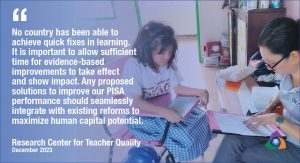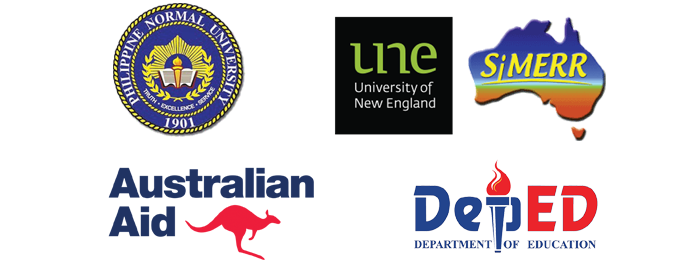RCTQ’s statement on the Philippines’ participation in PISA 2022
December 2023
 “The recent results of the Program for International Student Assessment (PISA) have again underscored the educational underachievement of 15-year-old Filipino students, in the subject areas of mathematics, reading and science, when compared with students in over 80 countries. The findings necessitate urgent national attention, and must be treated as a national emergency.
“The recent results of the Program for International Student Assessment (PISA) have again underscored the educational underachievement of 15-year-old Filipino students, in the subject areas of mathematics, reading and science, when compared with students in over 80 countries. The findings necessitate urgent national attention, and must be treated as a national emergency.
In addressing this crisis, there must be recognition of what has already been started and achieved in the Philippines. The country has embarked on various initiatives over the past decade, focusing on enhancing teacher quality and introducing essential reforms based on evidence. These reforms include aligning the education system with 21st Century teaching practices; clarifying teacher roles; enhancing teacher career employment, progression and promotion; and establishing frameworks for teacher quality and development.
Several ongoing initiatives by the Department of Education (DepEd), including those by bureaus under the Curriculum and Teaching Office, the National Education Academy of the Philippines (NEAP), and the strengthened Teacher Education Council (TEC), are building upon these ongoing reforms. The Research Center for Teacher Quality (RCTQ) stresses the importance of allowing sufficient time for these evidence-based improvements to take effect and show impact. No country has been able to achieve quick fixes in learning. It takes careful planning and focused resources, national will, and considerable time to move an education system forward. It is also RCTQ’s view that any proposed solutions should seamlessly integrate with existing reforms to maximize human capital potential.
The role of the tertiary education sector in improving the quality of education should not be overlooked. The quality of teacher education shaped by teacher education institutions directly influences the effectiveness of classroom instruction and learner outcomes. RCTQ calls for closer alignment of initial teacher training with real-life classroom and learner needs.
Parents, as key stakeholders, are urged to maintain high expectations and continuous encouragement for their children’s education. Family encouragement is a key factor in fostering students’ positive learning attributes, including resilience, persistence, and a strong willingness to exert effort.
Additionally, RCTQ advocates for a shift towards the development of ‘collaborative expertise’ among teachers, emphasizing teamwork and shared learning experiences. The encouragement of Learning Action Cells (LACs) by DepEd serves as a positive step toward empowering teacher teams and enhancing school planning, student practice, and teacher problem-solving skills.
Addressing the challenges identified by PISA 2022 requires coordinated efforts and commitment from all stakeholders to ensure a cohesive and effective approach to education reform in the Philippines.”

